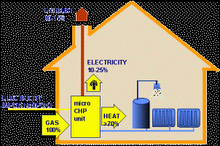What a brilliant idea! I had forgotten quite what an astute financial wizard Gordon was; yet another excuse for a stealth tax. Dress it up as a support measure for the fuel poor and bingo, another £750 million he does not have to find from his social budget. Of course this will in no way affect our energy bills. Of course not; the good old energy suppliers will take it on the chin and tell their shareholders that, due to the UK Government's inability to plan energy policy more than six months ahead, they will just have to accept lower dividends this year. So that means the pension funds will have less money, which in turn means that the pensioners will just have to accept less...all very diluted by that stage so no-one will notice. On the other hand they might just stuff it on the bills of those of us who pay our own, so that the increase is compounded rather than mitigated.
In the meantime, the Government is silent on where we are going to find £100 billion the energy companies say they will need to invest to keep the lights on over the next decade or so. Maybe we just won't bother closing our dirty old coal power plants...or maybe we will cover every roof in the country with PV. (Actually that would cost more than £200 billion, but at least it would make the PV industry obscenely rich).
Whilst this debacle unfolds, the debate around FIT (Feed In Tariffs) continues its perverse way. Already the obligation on suppliers to offer fair terms for export has resulted in a bunch of apparently attractive, but hopelessly unsustainable offerings including one where you get paid 18p/kWh for all you produce from microgeneration. So if you are rich enough to cough up £10,000 for a PV system, you can get the UK taxpayer to subsidise you to the tune of £2,500 (is that all the PV industry cries?), then your fellow tax/bill payers will subsidise you another 13p/kWh (around £200 per year) so you can demonstrate your eco-bling credentials. On the other hand if you install a £3,000 micro CHP system, you will get a more sensible payment of around 5p/kWh, more or less what it should be worth on the wholesale market. When I say, "should be", the sad reality is that it is currently worth nothing at all as there is no system in place for suppliers to trade export from microgeneration; the proposed infrastructure changes would have swallowed the entire value of any electricity produced by householders using any microgeneration technology. So the notion of introducing a FIT which would reward each and every technology at a different rate and, according to some proponents, would include heat (even though you cannot conceivably export heat), would raise a few interesting challenges for all concerned. Never mind, as long as the PV gravy train carries on. Of course, the FIT advocates are perfectly well aware that a FIT based on the German model is a no-hoper logistically, so what are they really after? It turns out that they are actually proposing a "deemed" FIT which takes an assumed output from each microgeneration technology over its entire life and capitalises it up front. This FIT (aka capital grant) should encourage microgeneration, well PV at least; based on the German levels of subsidy, a typical PV system producing 1600kWh annually would attract a grant of £12,800. Not bad for a system that costs £10,000; you could be paid (by your neighbours) to take it! Last one to sign up is a cissy!
Wednesday, 3 September 2008
Subscribe to:
Comments (Atom)
